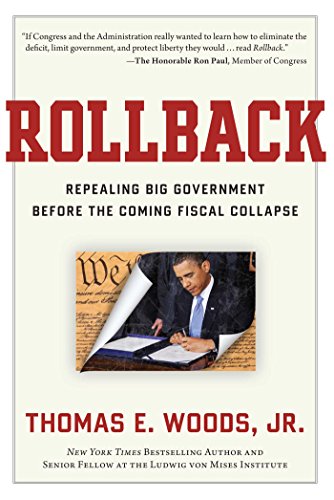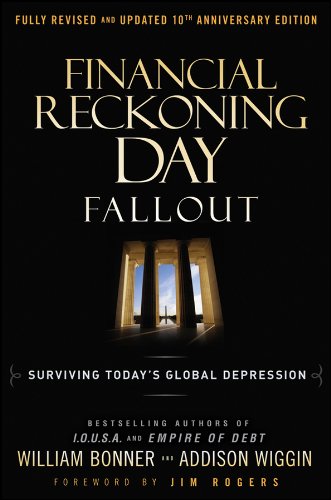Recently by Bill Bonner: The World Goes Crazy
Yesterday, we promised a new idea. Alert readers may have noticed – we didn’t deliver.
But when you have a new idea you don’t just throw it out like small change. It requires a certain amount of preparation…a bit of fanfare…a drum roll and a countdown.
The subject yesterday was European debt. The bond vigilantes came ashore in Portugal, attacking Portuguese government bonds. They seemed to be heading for the Spanish border.
All over Europe, the cry went up: “Can anyone stop them?”
It was as if the Huns were at the doors of Vienna…or the Moors were massed at the walls of Poitiers. Where is Charles Martel when you need him?
 Rollback: Repealing Bi...
Best Price: $1.28
Buy New $10.01
(as of 05:25 UTC - Details)
Rollback: Repealing Bi...
Best Price: $1.28
Buy New $10.01
(as of 05:25 UTC - Details)
The funny thing about yesterday’s news was that Japan had come to Europe’s aid. Following China’s lead, Japan said it would lend the poor Europeans some money.
What are these strange benefactors up to? Why would Japan – with the highest debt load in the world…and barely able to finance its own deficits – lend to Europeans? But the Asian rescuers are just exchanging bad US-dollar debt for bad European debt. They must figure that they are up to their eyeballs in American paper…might as well diversify into some Euro trash as well.
 Financial Reckoning Da...
Best Price: $2.36
Buy New $2.49
(as of 04:30 UTC - Details)
Financial Reckoning Da...
Best Price: $2.36
Buy New $2.49
(as of 04:30 UTC - Details)
The other thing it signals is more shift of wealth, from the West to the East. Asians are now creditors to Europeans and Americas. That’s just the way it works. The old world goes into debt to the new world. America is part of the Old World now. The Asians will now be calling the shots.
Which brings us closer to our idea.
But hold on…one second, Dear Reader… Let’s look at yesterday’s financial news.
The Dow rose 34 points. Gold rose $10. Nothing much to talk about.
But check out these headlines from The Wall Street Journal:
“Job openings fall in tough market,” says one.
“Downturn’s ugly trademark,” begins another. “Steep, lasting drop in US wages.”
Now just hold on a cotton-pickin’ minute. What happened to the recovery?
It did just as we said it would do – it vanished. The Great Correction began in 2007. It is now in its 5th year. But it’s not over.
 Mobs, Messiahs, and Ma...
Best Price: $0.25
Buy New $8.01
(as of 04:35 UTC - Details)
Mobs, Messiahs, and Ma...
Best Price: $0.25
Buy New $8.01
(as of 04:35 UTC - Details)
Case-Shiller, the real estate analysts, now report that the “double-dip” in housing is here. Prices are falling again in many areas.
 The Road to Serfdom: T...
Best Price: $3.06
Buy New $1.99
(as of 03:40 UTC - Details)
The Road to Serfdom: T...
Best Price: $3.06
Buy New $1.99
(as of 03:40 UTC - Details)
Prices at the consumer level are not exactly falling…but they’re not rising much either. The official CPI is flat at barely 1% increase per year. This isn’t much comfort to the average household – which has higher food and energy bills (not included in the core CPI reading) to pay. But the low figures show us that we’re still in a Great Correction, not an inflationary recovery.
And, there were fewer job postings in November than the month before. And here’s the bad news: if you lose your job, a pox will be on your house for generations. No kidding. According to a study by a Columbia economist, you are likely to earn less in your next job, if you get one. Not only that, fast-forward to 2030 and you’re likely to still be earning less than colleagues who weren’t laid off.
But it gets worse. Your children are likely to earn less too…and heck, maybe even your grandchildren.
The article mentions a manufacturing manager with two masters degrees. He was earning good money until he lost his job. Now he’s sweeping floors. He’s a janitor earning $9 an hour.
What good are those two masters degrees? Apparently, no good at all.
Another of the people spotlighted by the WSJ hopes to beat unemployment by going back to school. More degrees will lead to better job prospects, she thinks.
She should read the article. It doesn’t seem to work that way. More education may not pay off. Why?
Again, we return to our new theme…our new idea.
January 13, 2011
Bill Bonner [send him mail] is the author, with Addison Wiggin, of Financial Reckoning Day: Surviving the Soft Depression of The 21st Century and The New Empire of Debt: The Rise Of An Epic Financial Crisis and the co-author with Lila Rajiva of Mobs, Messiahs and Markets (Wiley, 2007).




